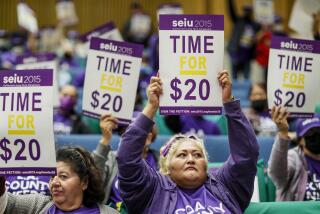Some lawmakers want to make it illegal to ask your salary history

Itâs a question dreaded by anyone interviewing for a job: Whatâs your salary history? Say too much, and put yourself out of contention. Say too little, and worry youâll be underpaid.
Three Democrats in Congress think employers should be banned from asking it. Eleanor Holmes Norton (D-D.C.), a nonvoting delegate, and Reps. Rosa DeLauro (D-Conn.) and Jerrold Nadler (D-N.Y.) said in a recent announcement that they planned to introduce a bill that would prohibit employers from asking about candidatesâ past compensation before making them a job offer.
The reason, however, isnât simply to eliminate a question no one likes. Itâs because of the role itâs said to play in perpetuating the lower salaries that women and people of color receive more often, even early in their careers.
âUltimately, the only way to make sure women and minorities will be treated equally is to remove the early biases that exist, both in hiring practices and salary negotiations,â Rep. Nadler said in a statement announcing the plans Aug. 30. âOur bill works to eliminate those obstacles by requiring employers to offer salaries based on the value of the work.â
Itâs the latest sign that efforts to dump the dreaded question could be gaining momentum. In early August, Massachusetts became the first state in the nation to ban the question when Republican Gov. Charlie Baker signed an equal pay bill into law that passed unanimously by both of the stateâs legislative branches. Similarly, it said employers could not ask about salary history until a job offer was made, though lawyers said it did not prevent candidates from volunteering the information or appear to keep employers from asking about a desired range in pay.
That recent law was cited in the Democratsâ announcement. âMassachusetts has taken a bold step forward in closing the wage gap by preventing employers from asking salary history in interviews,â Rep. DeLauro said in the statement, âand I strongly urge Congress to follow the stateâs lead and enact this legislation.â
In California, an amendment to the stateâs Fair Pay Act, which went into effect at the beginning of this year, would prohibit employers from basing compensation decisions on prior salaries alone. Colorado is also weighing a bill that addresses prior salary, said Noreen Farrell, the executive director of Equal Rights Advocates, a nonprofit that sponsored equal rights legislation in California. She thinks thereâs been a âchange in tideâ from the business community that could be helping the momentum on the issue.
âI tend to be a realist, but I have been really been very buoyed by business support for very strong fair pay laws,â Farrell said.
Meanwhile, some high-profile human resources executives have spoken out against the question. Googleâs former head of âpeople operations,â Laszlo Bock, wrote in an op-ed in the Washington Post in April that the âfundamental problemâ in fixing the gender wage gap âis hidden in the way we make pay decisions. Fixing it requires us to focus on paying people what a job is worth -- and not basing a pay decision on someoneâs current salary.â
Still, the chances of such a bill becoming law in todayâs legislative environment in Washington, particularly any time soon, donât seem particularly promising. The Paycheck Fairness Act, or bills similar to it legislating equal pay, have been introduced in every Congress since 1997, according to the website GovTrack.
Still, it shouldnât be counted out yet, said Fatima Goss Graves, a senior vice president at the National Womenâs Law Center.
âPeople can see the connection of the deep unfairness of carrying past discrimination with you to job after job,â she said. And the support the issue received from the business community in Massachusetts could be galvanizing. âWhen states show that something is possible, thatâs extremely reinforcing.â
Even if it doesnât go anywhere at the national level, Goss Graves believes that more states could follow suit. âJust as weâre seeing Congress take this up,â she said, âin 2017 I think this will be an issue to watch.â
More to Read
Inside the business of entertainment
The Wide Shot brings you news, analysis and insights on everything from streaming wars to production â and what it all means for the future.
You may occasionally receive promotional content from the Los Angeles Times.










